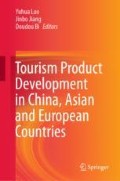Abstract
Based on the study of previous theoretical literature and the practical phenomena related to the tourism islanding effect, this paper tries to establish a conceptual framework for a systematic analysis of tourism island phenomena including its concepts, categories, characteristics, forming causes etc. The paper considers that a tourism island refers to some specific geographic areas that are dominated by the tourism industry and developed in isolation from surrounding communities. According to the study, the tourism islanding effect can be divided into four specific categories. The paper also finds out that the tourism islanding effect exhibits some features which can be described as monopoly, spatial closure, self-circulation and exclusion/extrusion. The paper also discusses the impact of the islanding effect and gives some suggestions for regulations.
Access this chapter
Tax calculation will be finalised at checkout
Purchases are for personal use only
References
Jin-he, Z., Jia-jia, L., Dong-dong, C.: An analysis of isolated island impact of tourist economy on scenic spots. J. Anhui Norm. Univ. (Nat. Sci.) (06), 712–717 (2007)
Li, T., Hui, Z., Yi, Y.: Research of tourist areas islanding effect theory. Thinking 42(04), 149–152 (2016)
Saarinen, J.: Enclavic tourism spaces: territorialization and bordering in tourism destination development and planning. Tour. Geogr. 19(3), 425–437 (2017)
Ai-li, L., Jia-ming, L., Min, L.: Progress in overseas enclave tourism study. Hum. Geogr. (01), 102–106+156(2008)
Qin, Q.: Research on tourism enclave and community economic conflict and its governance. China Manag. Informationization 21(22), 115–116 (2018)
Cohen, E., Neal, M.: A middle eastern Muslim tourist enclave in Bangkok. Tour. Geogr. 14(4), 570–598 (2012)
Xu-ke, W., Jian, S.: Urban isolated island phenomenon and countermeasures to it. Urban Probl. (03), 34–37 (2010)
Yun-cai, W., Li-ying, H.: The models of traditional culture landscape conservation based on landscape isolation analysis: a case study on Luzhi Town in Jiangsu Province. Geogr. Res. 33(01), 143–156 (2014)
Hong-jie, X.: On the enlightenment of tourism enclave to tourism development of ancient villages in Xiushui, China. Value Eng. 30(08), 139–140 (2011)
Xi, J., Kong, Q., Wang, X.: Spatial polarization of villages in tourist destinations: a case study from Yesanpo, China. J. Mt. Sci. 12(4), 1038–1050 (2015)
Xian-hong, B.: Analysis on the formation mechanism of urban tourism growth pole based on the perspective of tourism industry cluster. Commer. Res. (01), 203–206 (2008)
Xian-hong, B.: Analysis on the forming mechanism of metropolitan tourism core-periphery spatial structure: in view of coordinated development between urban tourism central and peripheral districts. Areal Res. Dev. 28(04), 67–71 (2009)
Bing, Z.: Distributive justice: interest games and equilibrium in tourism development. Tour. Trib. 31(01), 12–21 (2016)
Ling-yun, Z.: A preliminary discussion about regional unbalanced growth of Chinese tourism industry. Nankai Econ. Stud. (02), 69–72 (1998)
A-li, Y.: Enlightenment of growth pole theory on ecotourism planning in Western China. Res. Dev. (06), 79–82 (2006)
Yao-yun, L., Shan, L.: Explaining spatial evolution of tourism destination circles: a perspective from nesting model and utility analysis. Tour. Trib. 30(06), 17–29 (2015)
Zhao, L.: An empirical research on differences of China’s tourism development: a polarization theory perspective. Tour. Sci. 25(06), 13–24 (2011)
Rodwin, L.: Metropolitan policy for developing areas. Daedalus 90(1), 132–146 (1961)
Acknowledgements
This paper is the study advancement of the project “Research on the Measurement and Regulation Mechanism of Tourism Islanding Effect” funded by Chinese national social science foundation.
Author information
Authors and Affiliations
Corresponding author
Editor information
Editors and Affiliations
Rights and permissions
Copyright information
© 2020 Springer Nature Singapore Pte Ltd.
About this chapter
Cite this chapter
Tian, L., Pu, W., Liu, L. (2020). Tourism Islanding Effect: A Conceptual Framework. In: Luo, Y., Jiang, J., Bi, D. (eds) Tourism Product Development in China, Asian and European Countries. Springer, Singapore. https://doi.org/10.1007/978-981-15-4447-7_15
Download citation
DOI: https://doi.org/10.1007/978-981-15-4447-7_15
Published:
Publisher Name: Springer, Singapore
Print ISBN: 978-981-15-4446-0
Online ISBN: 978-981-15-4447-7
eBook Packages: Social SciencesSocial Sciences (R0)

